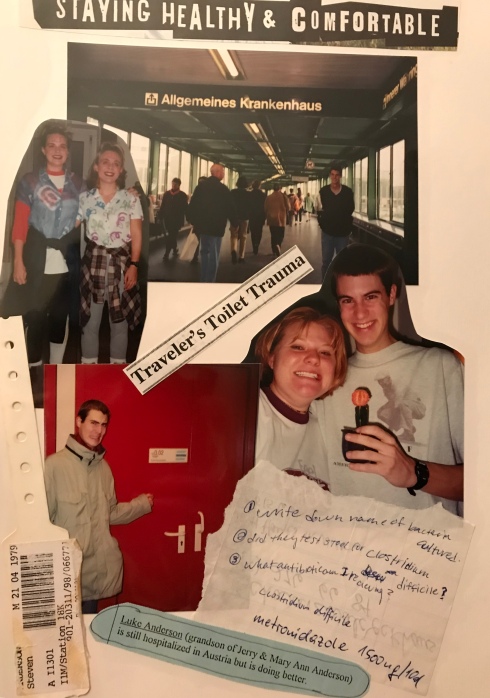Working with kids who have only been alive for roughly a third of my years has its advantages, perhaps the most important being that when most of your shirts are dirty and you decide to wear the school-issued uniform polo because it’s clean, they sometimes confuse you for a student. The week of my fortieth birthday, it happened twice. Happy birthday to me.
However, to keep me grounded firmly in my aging reality, I had to renew my driver’s license the same week, which meant a new picture. Anyone who knows me understands that my poor, light-sensitive, blue eyes ruined my shot at a modeling career because a flash immediately makes me look like a crazy stalker trying to suck your soul out with my startling wide-open eyes. (For photographic evidence, you can check out the “Crazy Eyes McGee” photo album on Facebook, or the collages from my dear friend Nicole.) In addition to the crazy eyes, I also have fair skin, for which I should wear sunscreen daily. I did not wear said sunscreen last weekend at my kickball doubleheader, and ended up with a sunburn resembling raccoon markings on my face, topped off with a nose bright enough to rival Rudolph’s. Those same dear students looked at me in horror, asking repeatedly either why I was mad all day or if was I sunburned. Suffice it to say, between the eyes and the red, I will only be going places that do not require a photo ID for the next decade.
Such is the dichotomy of forty, at least what I can gather from this new phenomenon. And the good part is that I’m settling into a place in life where I can take both in stride. Maybe this is due to the major life construction that happened in the last decade, where I finally found my city, my career, my person, and just my general footing in a way that has given me a more solid foundation. Or maybe I’ve learned to care less about things that don’t matter or that I don’t have control over in the first place.
Take, for instance, my body. I know that some of you will want to punch me in the throat for this, but hear me out. I have always been thin. Like never went through an awkward adolescent larger stage, didn’t have to try to have abs, still have 7th grade girl arms to this day, thin. My friend Stu always used to tell me that my metabolism would get the better of me around 26. Then he changed it to 28. Then he said 30. Then he said he hated me.
Well, he was about a decade off. My body has definitely begun to shift and change. The business of teaching a new grade almost every year for the past few years, which means creating and learning new lesson plans for every single lesson, meant less time for yoga or running. This, in turn, meant my pants started feeling funny around the waistband, and for the first time I thought about getting rid of clothing because it didn’t fit my stomach. My abs started merging from six into one. My hairline started creeping back ever so slowly. Instead of six chest hairs (each of which had their own individual name), I had twenty-six (or too many to name). I had to start trimming my nose hairs, but I could finally grow a somewhat respectable beard without being ridiculed. I got weird rosacea on my face. The skin on my thighs changed texture to resemble tanned leather. I stopped being able to sleep through an entire night most of the time. Before I knew it, I was like a stranger in my own body.
At first, this was disconcerting. I got frustrated with my body for not responding the way it used to. It’s not fair to be one way for almost four decades and then up and change, right? This is where I would’ve broken up and said it’s not me, it’s you. Or I would have fired it for not meeting expectations. But you can’t dump or fire your body, you’re stuck with it. So now what?
In a wild, and probably too-rare, attempt at personal growth, I decided to make friends with my “new” body. First, we needed to get acquainted, like dating. I started learning how getting off my phone by 9 p.m. meant a better night’s sleep. I found a good moisturizing lotion to use daily that helped my skin. I started using aftershave. I noticed that my body was regularly communicating with me about what it needed if I would just listen. And I found a balance between letting go of demanding my body be its 20-year-old self and still working on the parts that I had control over.
My body is just one example of learning to be more at ease in the world around me as I round the corner into my forties. I’m trying to apply these same lessons to other areas like daily moisturizer, with varying degrees of success. But I think this is going to be a more forgiving decade, so I’m excited for years where I know who I am, I know my place, and I know my purpose.
Now, if I could just find a way to make peace with that driver’s license photo…

